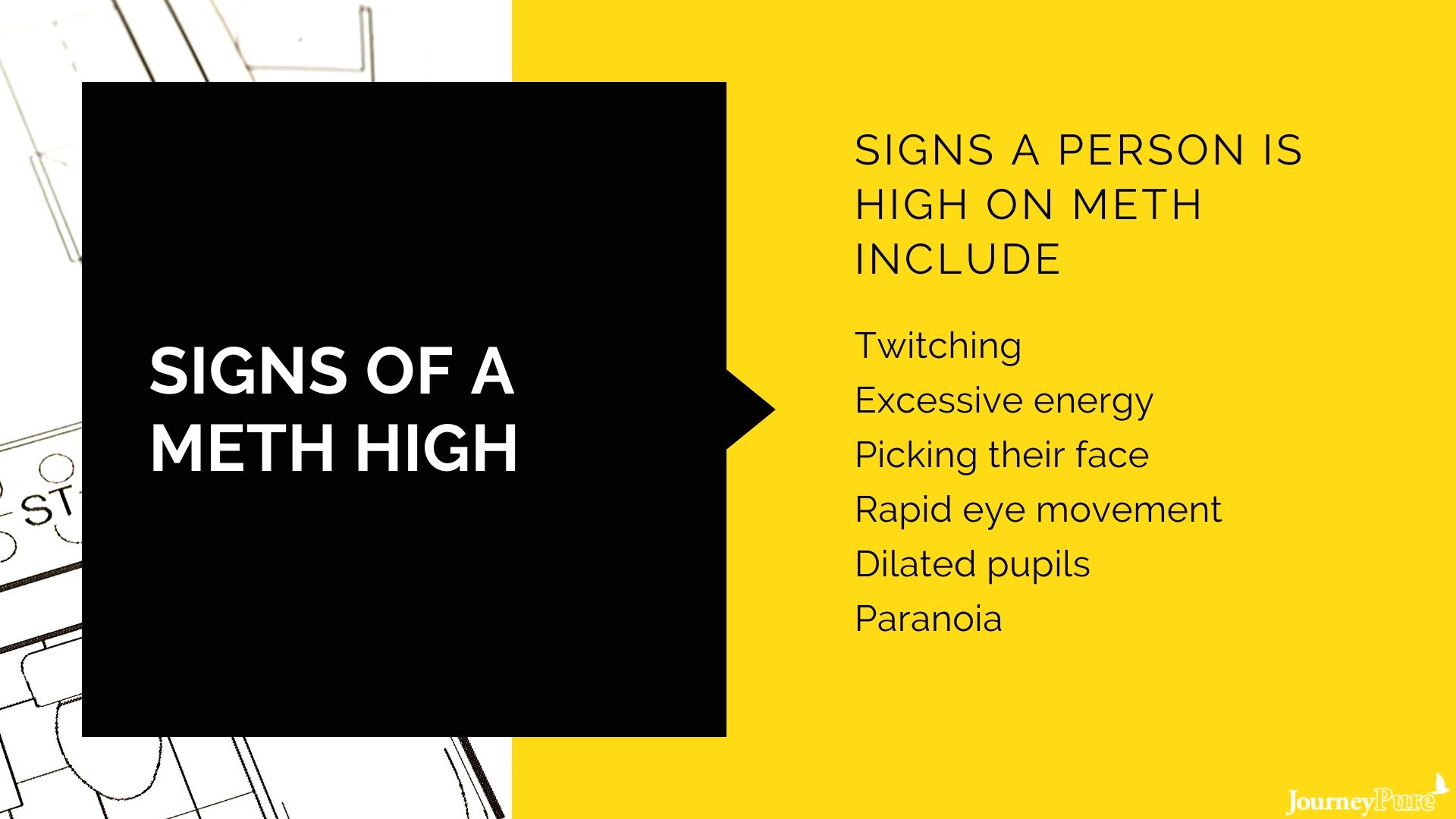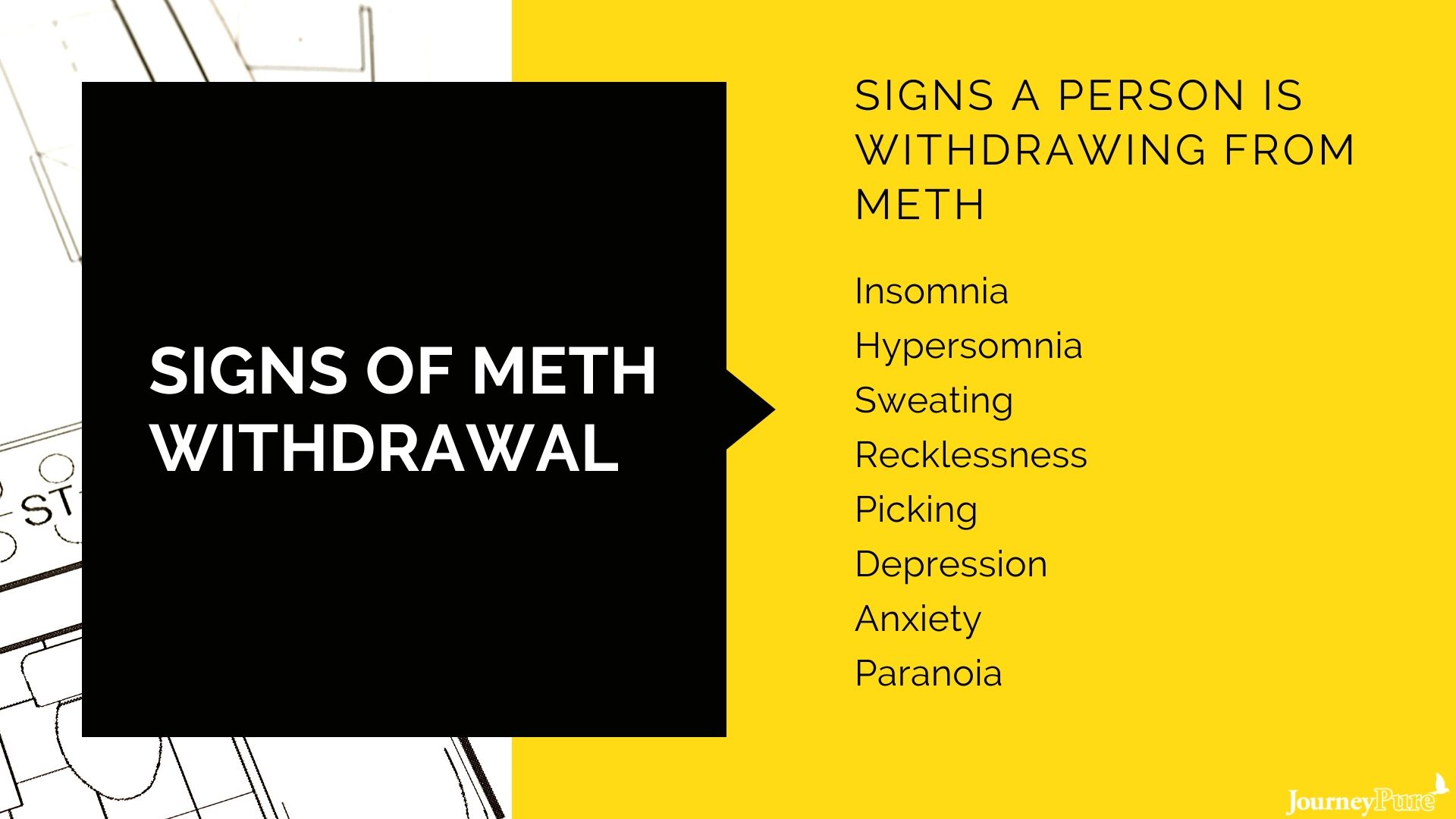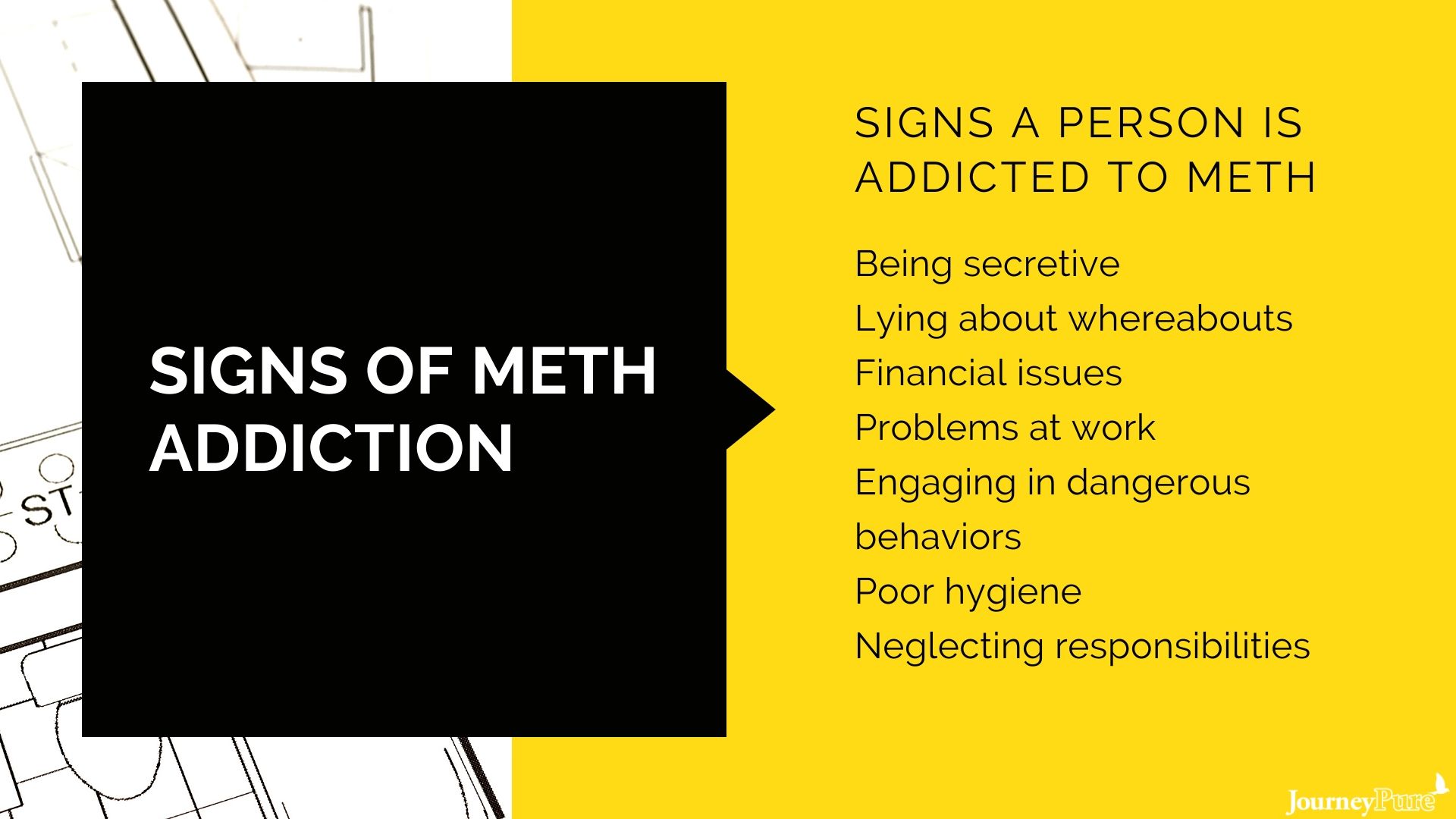Many people are drawn to meth because of how it makes them feel when they are high. When meth is abused, an increased sense of self-confidence and euphoria come on in a sudden rush that keeps users coming back for more. Because of its addictive properties, it does not take long for someone to go from abusing meth to becoming fully addicted to it.
If you think you may be addicted to meth or are fearful someone you love is addicted, it’s best to get accurate information before talking to them or searching for yourself. Let’s learn about the signs of meth addiction including signs of a person high on meth, signs of meth withdrawal, and how to get help through a medical detox and treatment.

Signs of a Meth High
Someone high on meth will exhibit several signs and symptoms, both physically and psychologically. The most common of these signs include:
Physical Signs
Meth is a central nervous system stimulant, so you can expect someone high on meth to exhibit symptoms of an accelerated system including:
- Tics, spasms, and twitches – More popularly known as ‘tweaking.’ Tweaking is an overactive central nervous system shooting off random and uncontrollable impulses through the body
- Missing or rotten teeth – Tooth and oral health degradation is a classic sign of meth addiction. Meth can decay tooth enamel and meth addicts tend to grind teeth. Tooth decay in addicts is commonly known as ‘meth mouth’
- Abundant amounts of energy – Extreme energy and mania are additional hallmarks of a meth addict. Meth puts the brain and body on turbo which leads to extreme personality changes. A person high on meth may want to suddenly rebuild a car engine, or come up with a get-rich scheme, or want to talk continuously. Everyone is prone to sudden bursts of energy, but most don’t stay awake for days at a time.
- Picking – Meth addicts pick at their skin and hair, even when painful. Open sores, scabs, and picking is an obvious sign of meth addiction.
- Rapid eye movement
- Drooping skin, especially in the face
- Weight and appetite loss
- Dilated pupils
- Raised body temperature
- Elevated heart rate
- Elevated blood pressure
- Rapid breathing
Psychological Signs
- Mood swings – Meth addicts experience high highs and low lows. If someone you know has suddenly become much more joyful than before or much lower, they could have a meth problem
- Mania – Everyone gets excited, but abundant excitement is a sign of mania
- Euphoria
- Paranoia and Anxiety
- Mental confusion and cloudiness
- Irritability
People who are high on meth can exhibit signs of mania, which are defined by things such as grandiose beliefs, talking rapidly and loudly, and inappropriate social behavior. Since meth is a stimulant, the effects that are most noticeable are those that make the user appear to be “moving faster” than usual.

Signs of Meth Withdrawal
Meth withdrawal symptoms can be as obvious as signs of someone actively addicted to the drug.
The Crash – The crash, also known as the come-down, is the acute period of withdrawal immediately after meth has left the system. The crash is essentially a meth hangover and comes with similar symptoms like depression, anxiety, and malaise. Some addicts can sleep for entire days during the crash. After the crash has passed meth addicts will experience other signs of acute withdrawal.
Physical Signs of Meth Withdrawal
- Insomnia
- Hypersomnia
- Sweating
- Restlessness
- Picking
Psychological Signs of Meth Withdrawal
- Depression
- Anxiety
- Paranoia
Signs of Meth Addiction
A meth addiction is not something that develops overnight. Instead, it is something that gradually develops within a short period of time (especially if being abused regularly). As with all other addictive substances, someone who abuses meth will eventually become tolerant to it, meaning that he or she will need to use a higher dose in order to achieve a high. As tolerance increases, they become psychologically addicted to the abuse of meth. The longer the meth abuse continues, the more likely it becomes for an individual to develop a dependence on it, meaning that he or she cannot stop using without experiencing painful withdrawal symptoms.
This is the silent process that occurs when meth abuse is becoming an addiction. What is more noticeable at this time are the user’s behaviors, which are being hijacked at the hands of the very drug they are abusing.
When someone is addicted to meth, he or she may display the following signs of the disease:
- Being secretive about their use (e.g. hiding paraphernalia, being dishonest about what they are doing behind closed doors, etc.)
- Lying to others about where he or she is going, who he or she is seeing, or what he or she is spending his or her money on
- Neglecting basic household duties like dishes, laundry, and general upkeep
- Ignoring their own need for proper personal hygiene
- Experiencing problems at work, home, and/or school because of meth
- Continuing to engage in dangerous behaviors despite the risk of serious consequences
- Continuing to use even if their use has caused harm to themselves or others (e.g. such as after causing a car accident or suffering an overdose)
- Experiencing financial distress due to funding their meth addiction
Once an addiction has developed, putting a stop to it can be extremely difficult, especially when an addiction to a drug as strong as meth is occurring.
Physical and Mental Signs of Meth Addiction
While one’s behaviors will undoubtedly change when addicted to meth, their physical and mental health will also become compromised, too. Meth is an incredibly dangerous substance to be addicted to for many reasons, but particularly because of what it consists of. It has a pseudoephedrine base and is combined with the following:
- Acetone (found in nail polish and paint thinner)
- Ammonia (found in fertilizer and household cleaners)
- Hydrochloric acid (used to create plastic)
- Lithium (used in batteries)
- Red phosphorous (found on matchboxes)
- Toluene (brake fluid)
- Sodium hydroxide (used to dissolve roadkill)
- Sulfuric acid (found in drain cleaner)
Each one of these chemicals is toxic and not designed for human consumption, which is one of the many reasons why it produces such horrific physical side effects. These effects include:
- Tooth decay, which is known as “meth mouth”
- Skin sores and acne
- Rapid aging of one’s appearance, including increase in wrinkles, dulling of skin
- Bone loss that can result in osteoporosis
Other Signs of Meth Addiction
Changes in personality – Does your even-tempered niece suddenly experience manic and depressive episodes? Did your spouse suddenly begin strange changes to their daily routine? Sudden personality changes, certain changes in schedule or other dramatic shifts might due to a drug or meth addiction.
Missing items – Meth is not cheap, and a chronic addict will need money to support their habit. It’s not uncommon or meth addicts to steal, lie, and fraud to get money to feed their addiction. If you notice a loved one selling off possessions of their own or notice possessions are going missing, it could be to feed their habit.
Sudden Financial Distress
If you’re afraid a friend or family member is addicted to meth and they suddenly need ‘like a hundred bucks’ from you-you’re probably right. If someone you know as generally financially healthy is suddenly having financial problems, there could be problems. Sudden financial distress can come from many outlets and will often only be an indicator of a meth addiction if there is already a suspicion.
Needing a Fix
Though any meth use is drug abuse there are many out there who think their meth habit is perfectly fine or not affecting their life in any negative way. This section will address questioning if your meth habit is a meth addiction. Yes. Meth can trick your brain into chemical dependence more quickly than you notice which means you have an addicted brain and body.
If you still think your meth use is fine, consider these questions. Could you leave it all behind right now? Has it negatively impacted your life – even once? Do you find yourself needing a fix before starting on a project or getting motivated? Do you need meth after a stressful day? This is addiction.
Getting the Help for Meth Addiction
If you or a loved one is addicted to meth there is a way out in modern treatment and rehab facilities. Our facilities are clean, warm, and only use well-researched methods and certified medical and treatment professionals to treat meth addiction.
Our treatment facility will help you detox safely and comfortably, then help you continue your recovery through counseling, education, and more. Meth addiction only ends in jails, institutions, or six feet under so get the help you need today if you’re addicted to meth.
From the JourneyPure team where we get to explore a wide variety of substance abuse- and mental health-related topics. With years of experience working alongside those suffering from substance abuse and mental health issues, we bring important messages with unparalleled knowledge of addiction, mental health problems, and the issues they cause.


